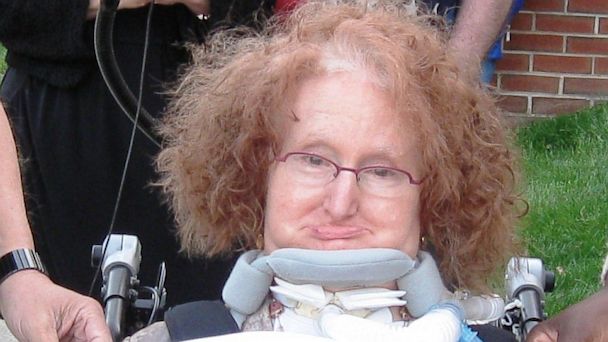Fighting ALS and Insurance Denials

Catherine Wolf successfully fought for insurance coverage while living with Lou Gehrig's disease. (Image credit: Catherine Wolf)
By Catherine G. Wolf:
Your health insurer might one day deny you something you absolutely need.
In my eighteen years of living with ALS, also known as Lou Gehrig's disease, I've learned how to deal with denials. Recently, my blood tests indicated I was severely anemic. It wasn't the first time I had been diagnosed with the low-iron disorder, and my doctor ordered Procrit, as he had done before. But my drug plan administrator had changed, and it had no record of past prescriptions for this drug.
My claim was denied.
Learn more about Catherine Wolf's life with ALS.
I emailed the health plans manager at my husband's employer, which provides my insurance coverage, and received the following response: "A review of the literature shows that there is no correlation between ALS and anemia."
In my opinion, this statement is nonsense on many levels. But the most important is that it was not based on evidence about me. The drug plan had completely ignored my lab results.
My nurse submitted lab results that documented the effectiveness of Procrit, and my health insurance overruled my drug plan's denial.
It was the second time a denial was based on what I consider to be a blanket statement rather than the evidence of my particular case.
In 2005, my insurance company case manager suggested I might like to move to a nursing home. No way! My health insurance company wanted to stop paying for what little home nursing I had. This was a big deal for my health and I couldn't afford to pay for nursing on my own. I got a lawyer who specialized in disability cases, and we decided to ask for full-time nursing. We were quickly denied by the insurance company.
It turned out my insurer had been directed by my husband's employer to stop all nursing for people on ventilators . I was on a ventilator. Again, the decision to deny me nursing was not based on the facts of my case. Instead, it was a policy decision. The case was decided by an independent arbitrator. And I won!
Learn about how some people with ALS are blocked from drug trials.
Here's what I've learned:
You're entitled to know the reason why your insurance company denied your request. Sometimes it may be that the diagnosis or procedure code was wrong. Easy to fix. If the service is not covered, you'll have a harder time, but there are always exceptions.
You're also entitled to any and all information relevant to your case. You have the right to have the denial in writing, and you have the right to get documentation about the appeals process.
It is also a good idea to keep copies of your medical records in case your health care provider changes.
One more thing: I'm covered by my husband's insurance, and his employer is self-insuring. That means the employer decides what's covered and the insurance company administers the rules. In such a case, your final appeal may be to the employer or sometimes to an independent arbitrator.
My advice? Don't take no for an answer. Get the facts and fight!
"A Day in the Life" is a series of blogs written by people who are living with medical conditions. This work is the opinion of the writer and not that of ABC News.